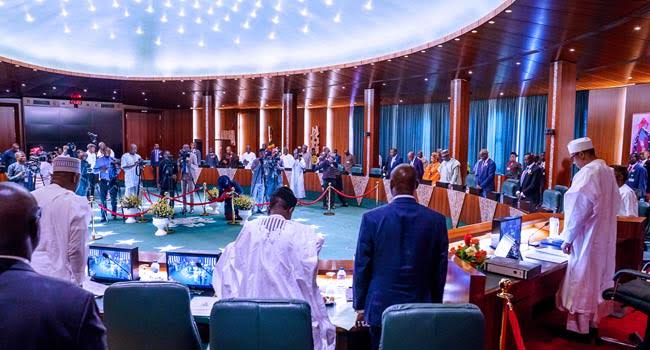The Federal Executive Council (FEC) has approved over N5 billion for various contracts in Lagos, Abuja, Kano and Katsina airports.
The meeting presided over by President Muhammadu Buhari in Abuja on Wednesday also approved the dualisation of the Odukpani-Itu-Ikot Ekpene road at the cost of N79.6 billion.
Special adviser to the President on Media and Publicity, Femi Adesina, and the Minister of Works, Babatunde Fashola, revealed this while briefing State House correspondents on decisions reached by the Council at the weekly cabinet meeting.
Mr Adesina said: “The Minister of Aviation presented a memo for the approval of the award of contracts at the Murtala Mohammed International Airport Lagos, Nnnamdi Azikiwe international airport Abuja, Aminu Kano International Airport, Kano and Katsina Airport in Katsina State.
“For Lagos, it is for the expansion of the terminal building at domestic terminal GAT for the sum of N2, 817, 579, 271.99. For the Katsina airport, it is for the expansion of the airport’s apron awarded at N527, 353, 095.12.
“There is also the expansion of Lagos cargo apron areas awarded at N1,982. 943, 242.31.
“Council also approved the expansion of Abuja domestic apron areas at N795, 976, 947.34 and also the expansion of Kano apron area at the cost of N1, 059, 120, 254.37,”
Mr Adesina said when completed, the contracts would go a long way in improving air transportation network in the country.
Mr Fashola revealed that the Council approved the dualisation of the Odukpani-Itu-Ikot Ekpene road at the cost of N79.649 billion.
According to the minister, the approved contract is in relation to the section from Oku Iboku Power Plant to Abak of about 26 kilometre stretch.
“The Ministry of Works and Housing presented the memorandum for the completion of the dualization of the Odukpani-Itu-Ikot Ekpene road. And this is in relation to the section from Oku Iboku Power Plant to Abak of about 26 kilometre stretch.
“Council approved the award to Messers Sematech Nigeria Ltd for N79.649 billion to be executed over 16 months.
“So, this will help complete the dualization gaps between the one awarded to Julius Berger and the section awarded to CCECC.
“When this is done, motorists in that area will now have an option of the dual carriageway instead of the existing single carriageway.
“And this is in recognition of the heavy cargo that passes through that area from the South-South through to the North Central, Benue through Katsina Ala through to the South East to Abia. It’s very very important trade link for the country.”
Asked to give an update on the 2020 contract award for the same project, Mr Fashola expressed regret that there had been paucity of funds to implement the project.
He said: “Okay, first of all, it’s important for us to have a common understanding of the area – that is the rain forest area of Nigeria, mangrove areas, very high water table and rains in seven, eight months of the year.
“So, when we awarded the first section, from Odukpani-Itu to Julius Berger in 2016, they could not move to site because of the limited budgetary requisitions.
“So, that slowed down work in that area and they didn’t move to site until 2018.
“And the second section, which was from Abak to Ikot Ekpene was awarded in last year, February 2020. We have had to mobilise some Sukuk resources to the area.
“Sometime last year, you might recall that I was there visiting with the governor, I actually went twice and we focused first on the link road from Alese Ugep area because that was a very big bad one, that one used to take like, three, four days to traverse a 70 kilometer road.
“Now, we have that under control, resolved, motorable in the first phase to Odukpani. That has reduced the journey time there to less than two hours, from days. So, again, it’s a work in progress.’’
On the recent collapsed of a section of the Lokoja-Kabba road, the minister attributed the incident to natural causes.
He said: “As we go through the rainy season, this is the context in which to locate the Lokoja-Kabba.
“It’s a failure caused by nature and aging. And, again, an opportunity to share with you what we have. We expect that these things will happen, but we don’t know where it will happen every time.”
While noting that his ministry was often unable to respond to such failures, he called for a contingency maintenance fund, which he said should have a sizable amount.
“So, we’ve been proposing that Nigeria should have an emergency provision in the works budget, but we haven’t been successful enough.
“There must be a contingency, a sizable sum, because when we see failures, last year, we had a problem like that in Kebbi, where roads were washed away.
“We couldn’t respond because we didn’t have the resources. But we will lean on FERMA.
“Well, traditionally back in Lagos when I was governor, I think we used to provide about five per cent of our capital expenditure as a contingency fund for emergencies. Something between three and five per cent varies across the world,” he said.
